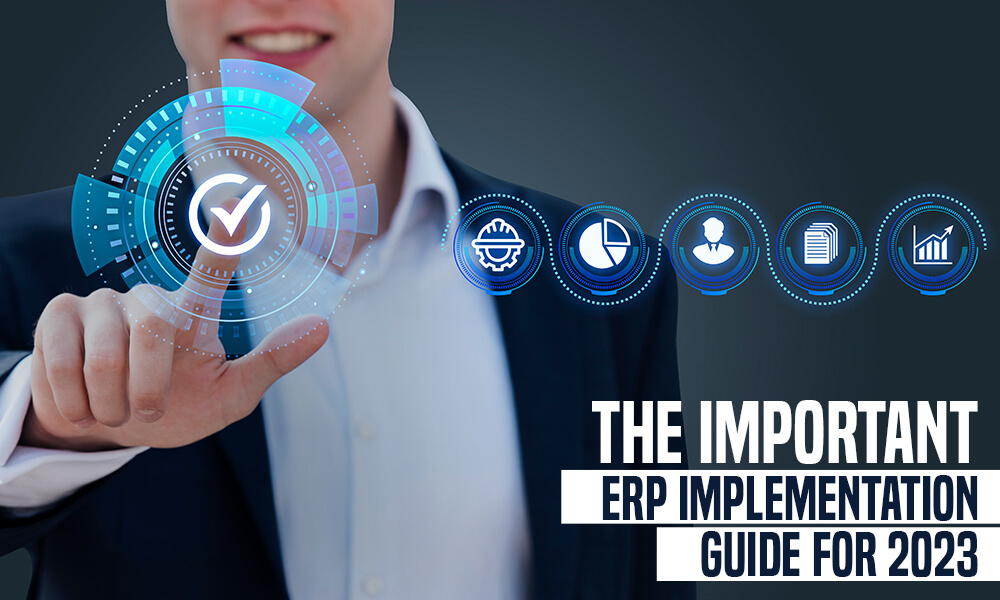ERP implementation is a significant undertaking for any organization, and following a structured methodology is essential to its success.
In today’s rapidly evolving business landscape, organizations are increasingly turning to Enterprise Resource Planning systems to streamline operations, improve efficiency, and enhance decision-making. The process of ERP implementation plays a crucial role when it comes to the efficacy of an ERP system.
Following are the insights into the key aspects of ERP implementation, its methodology, and the necessary steps to ensure a smooth and successful process.
What is ERP Implementation?
ERP implementation plays a crucial role in the process automation within an organization. It involves the integration with any existing applications/systems like accounting software, legacy systems, payment gateways etc. to automate business processes, manage resources and provide real-time insights seamlessly throughout the organization. A well-executed ERP implementation brings significant benefits, including improved productivity, reduced costs, enhanced data accuracy, and better customer satisfaction.
ERP Implementation Overview:
To effectively implement an ERP system, organizations must follow a structured methodology. It is important to have a well structured approach to ERP deployment, such that it ensures a smooth and successful transition from the existing systems to the new ERP platform. The implementation teams on both sides work closely to ensure the ERP implementation process is well-planned and aligned with the organization’s goals.
The ERP implementation phases include: project planning, requirements gathering, system configuration, testing, training, data migration, and post-implementation support.
ERP Implementation Process Flow:
The ERP implementation process follows a logical flow that ensures a smooth transition to new ERP systems. ERP software is chosen depending upon the specifics varying from organization to organization. An ERP software implementation involves the following steps:
- Project Planning Phase: Establishing clear objectives and expectations from the ERP implementation process is highly crucial. Therefore, this initial phase involves defining project goals, scope, timeline, and resource allocation.
- Gathering Requirements: This phase focuses on understanding the organization’s unique requirements and mapping them to the ERP system’s capabilities. Key stakeholders from various departments should be involved to ensure all business needs are captured.
- System Configuration: The ERP system is configured to meet the organization’s specific needs after the requirements are gathered. This involves setting up modules, workflows, defining user roles, and other system parameters.
- Testing: Rigorous testing is crucial to identify any functional or technical issues before going live. This includes unit testing, integration testing, user acceptance testing (UAT), and performance testing to make sure that its functionality is quick, smooth, and reliable.
- Training: Provide adequate training to end-users to ensure they effectively utilize the new ERP system. Ensure to monitor progress, provide support during the transition and make sure the training is tailored to each department’s need.
- Data Migration: Data from legacy systems or spreadsheets needs to be migrated to the ERP system. This involves cleansing, transforming, and importing data to ensure accuracy and integrity.
- Go-Live and Post-Implementation Support: The ERP system is deployed, and users start utilizing it for their day-to-day operations. Post-implementation support is crucial during this phase to address any issues, provide guidance, and continuously optimize the system performance.
The Most Important Stages of a Successful ERP Implementation:
While all phases of ERP implementation are essential, the project planning phase stands out as the most crucial step. Proper planning lays the foundation for a successful implementation process. Defining project goals, allocating resources, and establishing realistic timelines are crucial. A well-planned project ensures that all stakeholders are aligned and aware of their responsibilities, reducing the risk of delays, budget overruns, and scope creep.
The Role of ERP Software and SourcePro:
An ERP system serves as the backbone of an organization. It integrates various business functions and data into a centralized database, providing real-time visibility and insights. Selecting the right ERP software is critical to ensure it aligns with the organization’s needs and allows scalability with future growth plans.
SourcePro, a leading provider of ERP solutions, offers a comprehensive suite of integrated ERP software that caters to various industries. With our expertise and industry knowledge, we can guide organizations through the entire ERP implementation process, from planning to post-implementation support. Our team of experienced professionals ensure a smooth transition that maximizes the value derived from the ERP system.
In a nutshell, organizations can smoothly leverage ERP systems to streamline operations, improve efficiency, and gain a competitive edge by carefully planning, executing, and supporting the ERP implementation process. With the right ERP software and the expertise of a trusted partner like SourcePro, organizations can embark on a successful ERP implementation journey in 2023 and beyond.
Achieve your business’s full potential with ERP Implementation!
Let our team show you how our ERP solution can streamline your operations, improving the efficiency of your business. Contact us today!
